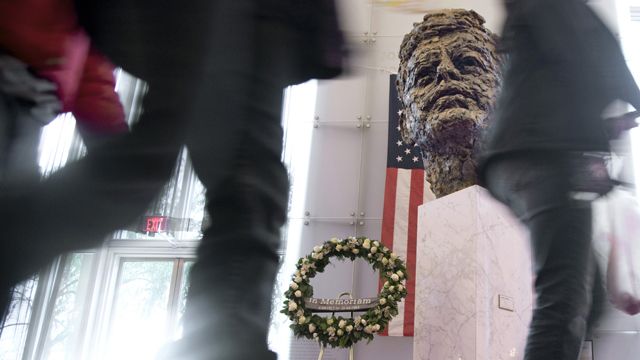The post first appeared in The Nation.

The right to vote in a free American election is the most powerful and precious right in the world — and it must not be denied on the grounds of race or color. It is a potent key to achieving other rights of citizenship. For American history — both recent and past — clearly reveals that the power of the ballot has enabled those who achieve it to win other achievements as well, to gain a full voice in the affairs of their state and nation and to see their interests represented in the governmental bodies which affect their future. In a free society, those with the power to govern are necessarily responsive to those with the right to vote.
–John Fitzgerald Kennedy, Special Message to the Congress on Civil Rights, 1963
There has been much honoring of the memory of President John Fitzgerald Kennedy this week, and rightly so. He was dynamic figure who preached a “new generation of leadership” vision that still serves as an antithesis to the listless, austerity-burdened rhetoric of so many of today’s political figures — including some in Kennedy’s own Democratic Party.
Kennedy saw himself as a liberal reformer, declaring in 1960 that: “If by a ‘Liberal’ they mean someone who looks ahead and not behind, someone who welcomes new ideas without rigid reactions, someone who cares about the welfare of the people — their health, their housing, their schools, their jobs, their civil rights and their civil liberties — someone who believes we can break through the stalemate and suspicions that grip us in our policies abroad, if that is what they mean by a ‘Liberal,’ then I’m proud to say I’m a ‘Liberal.’”
Kennedy was ardently in favor of religious tolerance, respect for immigrants and labor rights (in 1962 he signed Executive Order 10988, which established the right of most federal workers to bargain collectively). Yes, in his service as a senator from Massachusetts and later as the nation’s 35th president, Kennedy was a politician of his times, which meant that he could disappoint; surely, he was slower than need be when it came to challenging Cold War dogmas and in calling out southern resistance to social and economic justice. But Kennedy evolved, as did the nation he led, during the course of his short but transformational presidency.
Kennedy devoted much of the last year of his life to advocacy on behalf of voting rights. His great civil rights address — delivered in the last year of his presidency from the Oval Office to a national television and radio audience — argued that “it ought to be possible for American citizens of any color to register and to vote in a free election without interference or fear of reprisal.”
Fifty years after his assassination, Kennedy can be honored in many ways. But a renewal of his liberal commitment to voting rights would surely be a fine place to begin. The 24th amendment to the Constitution, which eliminated the poll tax, was placed on the national agenda by Kennedy, who made it his personal mission to eliminate the wealth barrier to voting.
Politically savvy, the president knew that enacting a constitutional amendment would be difficult, but he argued for going “the hard way” because of an understanding of the need to go around southern resistance in the Senate and because of a determination to lock in voting-rights gains.
Kennedy promoted the amendment in speeches and letters to the Congress, and then in a steady stream of telegrams and phone calls that prodded governors and legislators across the country to get their states on board.
In the last months before his death, Kennedy was in the thick of the struggle for voting rights, reminding Americans that: “Finally, the 87th Congress — after 20 years of effort — passed and referred to the states for ratification a constitutional amendment to prohibit the levying of poll taxes as a condition to voting. I urge every state legislature to take prompt action on this matter and to outlaw the poll tax — which has too long been an outmoded and arbitrary bar to voting participation by minority groups and others — as the 24th amendment to the Constitution.”
Beyond the bully pulpit, the president exchanged notes with governors such as Wisconsin’s John Reynolds regarding the details of legislative debates and votes. To a far greater extent than was known at the time, Kennedy personally managed the ratification process.
Thirty-six states ratified the amendment before Kennedy’s assassination — two short of the needed total. Kennedy and others hoped that Texas might break with other states and support the amendment. A statewide referendum on November 9, 1963, proposed to repeal that state’s poll tax and the campaign was intense. Opponents of repeal argued that people of color would “flood the polls” if the economic barrier to voting was removed. Supporters distributed literature that declared: “President Kennedy Wants You to Vote Saturday, November 9, to Repeal the Poll Tax.”
A special message from Kennedy read: “I share the conviction that the right to vote should not be denied or abridged because of the failure to pay a poll tax.”
The literature made the connection to the civil rights movement, urging a “yes” vote: “For Better Job Opportunities, For Better Housing, For Equality and Dignity, For Freedom.”
Unfortunately, a majority of Texas voters saw the change as a threat. They rejected repeal less than two weeks before Kennedy made his trip to Dallas. Yet, the president continued his advocacy, getting prominent Texans such as Vice President Lyndon Johnson and US Senator Ralph Yarborough to lend their names to the effort.
Kennedy died without seeing his amendment added to the Constitution.
But his labors were not in vain.
The final states, Maine and South Dakota, signaled their approval in the weeks after the president’s death
When the 24th amendment was added to the Constitution in January, 1964, the change in the founding document was heralded with front-page headlines in newspapers and broadcast reports from coast-to-coast; except, notably, in southern states where too many media outlets had aligned themselves with the massive resistance to civil-rights legislation — even when that legislation took the form of a constitutional amendment.
The constitutional elimination of the barrier Kennedy derided as “the property qualification” for voting signaled the arrival of what the late president had hoped for: “another turning point in the history of the great Republic.” With the enactment of the Civil Rights Act of 1964 and the Voting Rights Act of 1965, it seemed, finally, that the nation might move “beyond the new frontiers” of which Kennedy had spoken.
Unfortunately, as the historian Eric Foner reminds us, the history of the right to vote in America is one of expansion and contraction. And the rights Kennedy and so many others fought to expand have been contracting with the passage of restrictive “voter ID” laws, attacks on early voting and same-day registration, and a US Supreme Court move to gut the Voting Rights Act. Responding to the legislative and judicial assaults on voting rights, Wisconsin Congressman Mark Pocan and Minnesota Congressman Keith Ellison have returned to the constitutional route that John Kennedy charted when he set out to end poll taxes and property qualifications as a barrier to voting.
With support from groups such as FairVote and Color of Change, the struggle for a constitutional guarantee of voting rights has gone national. Communities across the country are passing resolutions urging Congress to approve the amendment and send it to the states. As in the period before Kennedy embraced the campaign for an amendment banning the poll tax, there is a burgeoning grassroots campaign for constitutional intervention on behalf of voting rights.
The Pocan-Ellison proposal states in simple language the values that voting-rights campaigners have championed for decades: “Every citizen of the United States, who is of legal voting age, shall have the fundamental right to vote in any public election held in the jurisdiction in which the citizen resides,” and “Congress shall have the power to enforce and implement this article by appropriate legislation.”
Or, as John Fitzgerald Kennedy put it in 1963: “It is necessary (to) free the forces of our democratic system…promptly insuring the franchise to all citizens, making it possible for their elected officials to be truly responsive to all their constituents.”


